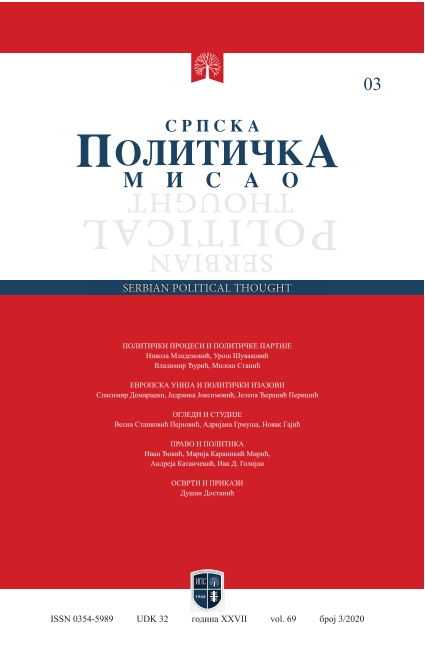PARTICIPACIJA RODITELJA U PREVENCIJI I SUZBIJANJU ŠKOLSKOG I VRŠNJAČKOG NASILJA – MEĐUNARODNA ISKUSTVA I STANJE U SRBIJI
PARENTAL PARTICIPATION IN PREVENTION AND INTERVENTION OF SCHOOL VIOLENCE AND BULLYING – INTERNATIONAL EXPERIENCE AND SITUATION IN SERBIA
Author(s): Adrijana T. GrmušaSubject(s): Politics / Political Sciences
Published by: Институт за политичке студије
Keywords: school violence; bullying; school-parent partnership; parental participation in school; Epstein’s parent involvement model
Summary/Abstract: In line with Epstein’s model of the school-parent partnership, this paper discusses international experience and situation in educational system in Serbia in terms of parental participation in the prevention and intervention of school violence and bullying. International experience, presented by American and Western European research and studies, examined parental participation not only as an element of special prevention and intervention programs, but also as an element of regular partnership between school and parents. The findings show that decision making, communicating and volunteering are associated with lower prevalence of school violence. Combination of parenting and communicating implemented in the form of individual parent-teacher meetings is of vital importance in anti-bullying programs in schools. The strategic orientation, legislative framework and program “School without Violence” of the Serbian educational system nominally enable parents to participate in all forms of Epstein’s parent involvement model. These include school operations and management in general and the field of violence prevention and intervention. There are three complementary levels of participation. The first level implies participation in decision making where contents of prevention and specific intervention measures are formulated within the School board, Parents’ Council and Local Parents’ council. The second level implies participation in implementing legally binding measures of violence prevention and intervention, while the third level includes activities within the program “School without Violence”. However, the findings of research conducted in Serbia, show that exploiting these opportunities is at low level in practice. Schools in Serbia lack precisely those forms of participation that are associated with lower prevalence of school violence. Only a small number of parents use legally provided opportunities of participating in decision making, communication is reduced to group parent meetings, and volunteering is enabled for a small number of parents. The analysis of the legislative framework and experiences of participatory practice in Serbia shows that the causes of such situation can be found in the parents themselves on the one hand, and in the shortcomings of certain normative solutions on the other. The most common parent related causes noted in research findings were the lack of interest, time, or skills for constructive communication with the school, as well as the negative experiences of previous cooperation. The main shortcomings of the legislative framework consist in the inadequate parents’ representation in school governing bodies, and the manner of electing parents’ representatives, which essentially depends on political interests at the municipality level. Therefore, the paper concludes by suggesting possible solutions for improving parental participation in practice which address both groups of recognized causes.
Journal: Српска политичка мисао
- Issue Year: 2020
- Issue No: 3
- Page Range: 215-242
- Page Count: 28
- Language: Serbian

